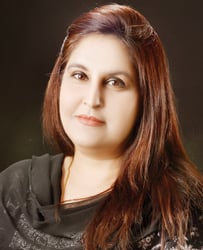Meet the judges
“A thing of beauty is a joy forever” - John Keats
Amberina Kazi, Roshana Kamran, Taha Kehar and Nabita Sadiq got this enthralling job of selecting the winners of the Us Poetry Competition ’17. They unanimously agree that these poems are “a joy forever”. Let’s find out on what points they based their judgement and if there was anything that struck them while reading the poems. We also asked the judges for their advice on how participants can perfect their poetry.
Amberina Kazi, Professor 
I liked reading the poems because firstly, I could see the sincerity and seriousness of purpose with which they had been written. Secondly, they were not unpracticed expressions of feelings and intellect. I enjoyed these writings of young people who expressed new and often fresh insights into universal relationships. I was also glad to see the experimentation with the form of poems as well as with the metre. All of these should match the theme/s of the poem, and this was successfully done on the whole.
Criteria
Advice
I enjoyed the poems where the poet had picked a verbal paint brush with which to express his/her truth. The verbal paint brush refers to the choice of and dexterity in the use of words, not the use of difficult words. Personally, I like poems which make the reader think, which progress from a starting point to another, and which bring movement and progression to the experience of reading; a strong voice is a plus.
Writing poems is the best way to experiment and thus grow in your craft. I would advise young poets to read good poetry to see how practiced poets use their medium. Further, please give more importance to using punctuation meaningfully. And make sure that the line length of your free verse is appropriate to your theme; short breathless lines do not match a philosophical tone and subject matter.
Finally, do read your poems aloud to yourself. Let some time elapse after having written a poem, and then re-read and edit it. Your choice of words is important, but you don’t need to use unnecessarily difficult words. You won’t win a competition with complex words alone. If possible, ask friends to read and discuss your poems with you. Getting a poet or a teacher to read and comment is a good idea, too.
Roshana Kamran, Lecturer
The experience has been an extraordinary one because all the participants created a masterpiece. Choosing the best was really a painful experience for me.
Criteria
Advice
Be original! Try to use rhyme and meter to accentuate your thoughts, and not to fill the verses. The thing that should be at the top of your list when you are planning to write a poem should be the message that you want to present. Choose the best words and be careful with punctuation; use 1commas, periods and dashes sparingly to strengthen your idea. The scope of a good poem depends on these elements. That’s why writing poem is more difficult than writing prose.
Taha Kehar, journalist and novelist
Each poem submitted for this competition opened a vista onto the concerns that rattle the young mind. Most of the submissions proved how participants were able to align their work with mature ideas and profound sentiments. This showed that young people are inspired by what they read and have the skill to connect it with what they see, feel and imagine. 
The participants appeared to be more comfortable with long poems as they had more space to flesh out ideas without compromising on creativity. Therefore, the short poems were comparatively less appealing than the longer pieces. A majority of poems contained images and thoughts processes that were slightly derivative, which made it difficult to judge them solely on the basis of the originality of ideas.
Criteria
It is difficult to quantify literature and there are no assigned criteria to judge the overall effect of a poem. When I received the shortlisted poems, I decided to read them four times. The first reading was aimed at developing a deep understanding of the poem’s concept and theme. The second reading helped me assess the technique employed in the poem (i.e., punctuation, capitalisation, structure). The third reading was geared towards exploring how language was used to translate thoughts into a string of ideas that appear readable and interesting. During the fourth reading, I recited the poems to determine if the words and image could retain their potency when translated into speech. However, the final reading helped separate the grain from the chaff.
Advice
At times, the concept/theme of most poems was mature and made the reader think. There was a strong tendency to write about lost love through cryptic imagery. This made most short poems seem repetitive and, at worst, unoriginal. That’s why a poem like Ellie the hair tie stood out.
Most participants were not courageous enough to use complex techniques in their poems. There were some who managed to weave in structural elements, such as punctuation, in an ingenious manner. But even these were few and far between. Few short poems did well as far as technique was concerned. However, it was surprising to see participants who wrote longer poems take risks with technique. For instance, in Present engages readers in this manner: “I’m not built/for anything/short of poetic./ Even if that means/silences/following more quietness”
Language wasn’t entirely a problematic factor in the submissions. However, the participants painted trite images by using ripe and refreshing words. This weakened their overall effect. There were a few exceptions. For example, in Message in a bottle: “Snow in the summers/a melody too raw and a wind too fierce/a fruit so ripe and a passion too deep”.
There is no substitute for revising a completed poem. Once you’ve written a poem, distance yourself from it. After a few hours or days, revisit the work with the intention of giving it more meaning and integrity. It is important to plumb the depths of your mind and explore all the creative possibilities in your poem. Editing is an important part of this process. Most participants’ submitted work was riddled with typos and needed to be drastically reworked.
There is also a need to focus on technique. A good way to achieve this is by reading poems.
Many poems relied heavily on emotion and drew limited inspiration from the surroundings. The message conveyed through these poems was, at best, personal. The participants should realize that poetry marries the physical world with the emotional and the public sphere with the private. Never rely on one to substitute the other.
Nabita Sadiq, Freelance writer
I appreciate the work of all the participants. The poems were interesting and carried a valuable treasure of emotions, feelings and observations. This is what I look for in a poem. It is important for a good poem to have originality of thought and I found a remarkable adherence to that principle in almost all the poems.
One thing I noted is our youth is emotional and witty. The poetry they produce is an eye-opening reflection of their emotional state.
Criteria
Advice
Originality of thought is important but being true to the craft is no less significant. Poetry appeals to the hearts. Having said that, verses should express what the poet truly feels about an event, a person or a place. The truth of expression inspires and makes the readers connect with the theme. However, if the flow of the verses doesn’t follow a chronological order, poetry tends to lose its intensity. So it is vital for the ideas to be coherent and well organized. Be it a sonnet with carefully constructed stanzas or blank verse, coherence can always be maintained.
Modern poetry is more about writing blank verse or free verse where we don’t find a strict division of stanzas or rhyming scheme. I can see that most of the participants have opted to write blank verse where they could express themselves freely and without any limitation of form. But even in that type of poetry, ideas can be coherently presented if the poets stick to the theme they’ve chosen to write on. Instead of drifting off to a whole new theme or concept, they should do justice to their chosen topic/idea. If that is not ensured, much of what the poet says remains obscure. This leaves the reader without a direction and the poetic idea eventually gets lost.